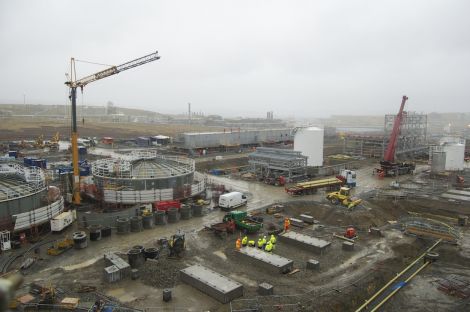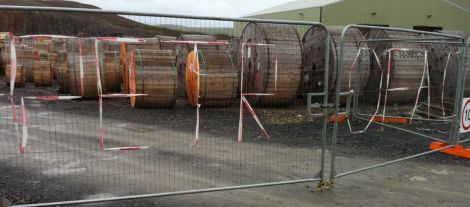News / Petrofac accepts blame for gas plant delays
CONSTRUCTION giant Petrofac has accepted responsibility for the 15 month delay in building the £800 million Shetland Gas Plant after unions attacked them for trying to shift the blame onto workers.
The unions’ outburst came one week after Petrofac, the chief contractor on the project, claimed bad weather and industrial action had caused the hold up, which has seen the multinational company lose almost £300 million and sent its share price falling.
In a hard-hitting statement this week, shop stewards with the main on-site unions GMB and Unite said Petrofac had “grossly underestimated” the complexity of the project they had undertaken.
On Wednesday Petrofac responded, saying they “publicly acknowledged our shortcomings on the execution of this project” and remained “committed to an ongoing dialogue with the unions on site.”
As a result the company had to employ far more workers than originally envisaged, chartering cruise liners and accommodation barges to house over a thousand men and hiring vast numbers of coaches to transport them to work for the past two years.
In a strongly-worded statement, the unions accused their employers of “an outrageous attack on the workers constructing this highly technical gas plant”.
They said blaming the workforce and the weather was “truly unbelievable”.
“This is the Shetland Islands, there are adverse weather conditions all year round.
“Didn’t Petrofac study the historical weather data of the Shetland Islands? The Shetland weather seems to come as a surprise to the Petrofac management.”
The gas plant was originally scheduled to start production in the first half of last year, but from the start workers were saying it would take much longer.
The current completion date is set for July at the earliest.
Evidence of the company’s lack of foresight, the unions suggested, was the 850-bed accommodation block that was custom built for this job, which ended up only being able to house one third of the workforce required during peak months.
Become a member of Shetland News
Last summer Petrofac flooded the site with 2,400 workers in a desperate bid to get the job finished.
To house the extra workforce, the Jersey-registered company has had to charter four accommodation vessels and five cruise liners – the latest arriving just this week – as well as hotels.
The shop stewards’ statement added: “Then on top of this Petrofac have had to hire/lease dozens of 52 seater coaches to transport the 100s of construction workers the round trip of about 60 miles a day to the SGP project.
“The aforementioned have been in place now for approximately two years, so…the accommodation and transport must have cost the SGP project millions upon millions of pounds.”
The unions said one of the main problems was that managers and supervisors kept changing.
They also remarked that “the view from a large majority of the workers (was) that a number of the supervision/management have not been earning their £100s a day pay based on their knowledge and skills of constructing a gas plant, but rather on who they know”.
Last week Petrofac chief executive Ayman Asfari admitted the company had “a lack of experience” working in environments with such “high labour costs and low productivity levels”.
The unions retorted: “We are employed under the Shetland Island Agreement as union members of independently recognised trade unions, which is compatible to the terms of the International Labour Organisation (ILO) which is a United Nations agency dealing with labour issues, particularly international labour standards, social protection, and work opportunities for all.
“Could this be said of the places of work regards the rest of Petrofac’s EPC project portfolio around the world?”
The Shetland Gas Plant is being built to open up the large gas fields west of Shetland in the deep Atlantic Ocean.
The project, which begins with a pipeline from the Laggan-Tormore field, is 80 per cent owned by French energy giant Total, who are now looking for a new investor to buy a 20 per cent share in the development. The other 20 per cent is owned by Danish energy company DONG.
Become a member of Shetland News
Shetland News is asking its many readers to consider paying for membership to get additional features and services: -
- Remove non-local ads;
- Bookmark posts to read later;
- Exclusive curated weekly newsletter;
- Hide membership messages;
- Comments open for discussion.
If you appreciate what we do and feel strongly about impartial local journalism, then please become a member of Shetland News by either making a single payment, or setting up a monthly, quarterly or yearly subscription.































































